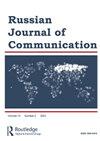政府的回应。推特上围绕俄罗斯网络威权主义新闻话题的讨论
Q1 Social Sciences
引用次数: 3
摘要
本研究使用社会网络分析(SNA)方法来确定Twitter围绕新闻主题讨论的主要参与者。首先,使用网络威权主义理论(MacKinnon, 2011),它概念化了威权国家可能影响国内媒体和更广泛的互联网的方式,并将俄罗斯作为我们的案例研究。它描述了俄罗斯的媒体系统及其背后的动机。接下来,讨论了Twitter在专制社会中的作用,并定义了Twitter在当今俄罗斯的作用。方法和结果之后,探索忠于国家的行动者参与在线新闻讨论,包括那些以支持俄罗斯国内和国际优先事项为中心的社交媒体,旨在为敏感新闻话题设定议程,从而支持现有的威权精英,同时减少反对声音。本文章由计算机程序翻译,如有差异,请以英文原文为准。
Government’s echo. Twitter discussions around news topics in Russian networked authoritarianism
ABSTRACT This research uses the Social Network Analysis (SNA) method to determine the main actors in Twitter discussions around news topics. First, using the theory of networked authoritarianism (MacKinnon, 2011), it conceptualizes the ways that authoritarian states may influence domestic media and the broader Internet, taking Russia as our case study. It describes Russia’s media system and the incentives behind it. Next, it discusses the role of Twitter in authoritarian societies and defines Twitter’s role in today’s Russia. Methodology and results are followed by an exploration of the involvement of state-loyal actors in online discussions of the news, including those centered on social media in support of Russia’s domestic and international priorities, aiming to set the agenda on sensitive news topics and, thus, support existing authoritarian elites while diminishing voices of opposition.
求助全文
通过发布文献求助,成功后即可免费获取论文全文。
去求助
来源期刊

Russian Journal of Communication
Social Sciences-Political Science and International Relations
自引率
0.00%
发文量
0
期刊介绍:
Russian Journal of Communication (RJC) is an international peer-reviewed academic publication devoted to studies of communication in, with, and about Russia and Russian-speaking communities around the world. RJC welcomes both humanistic and social scientific scholarly approaches to communication, which is broadly construed to include mediated information as well as face-to-face interactions. RJC seeks papers and book reviews on topics including philosophy of communication, traditional and new media, film, literature, rhetoric, journalism, information-communication technologies, cultural practices, organizational and group dynamics, interpersonal communication, communication in instructional contexts, advertising, public relations, political campaigns, legal proceedings, environmental and health matters, and communication policy.
 求助内容:
求助内容: 应助结果提醒方式:
应助结果提醒方式:


